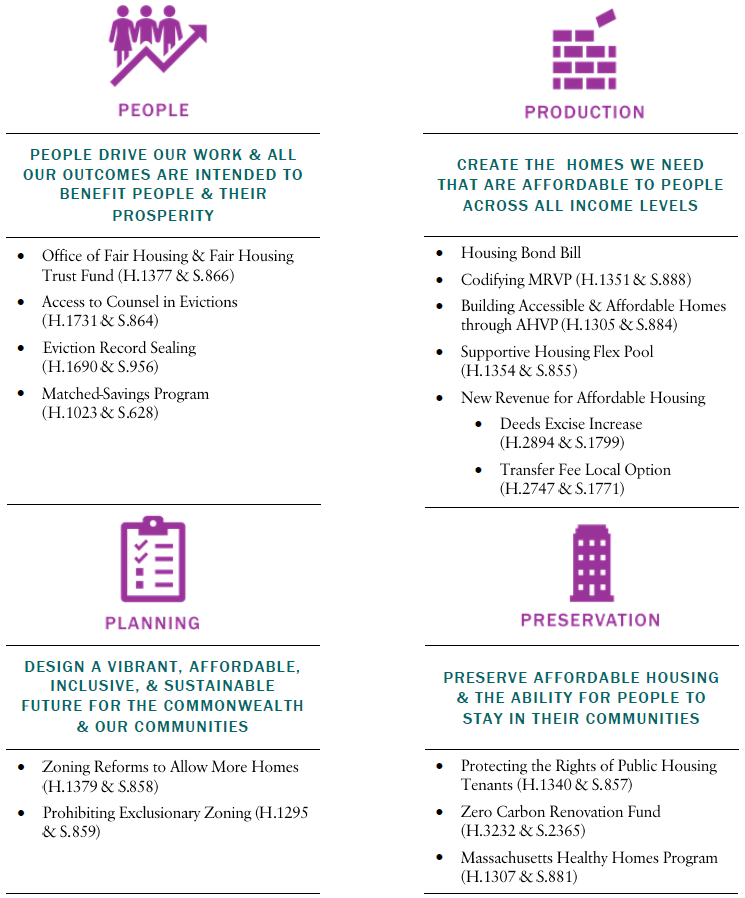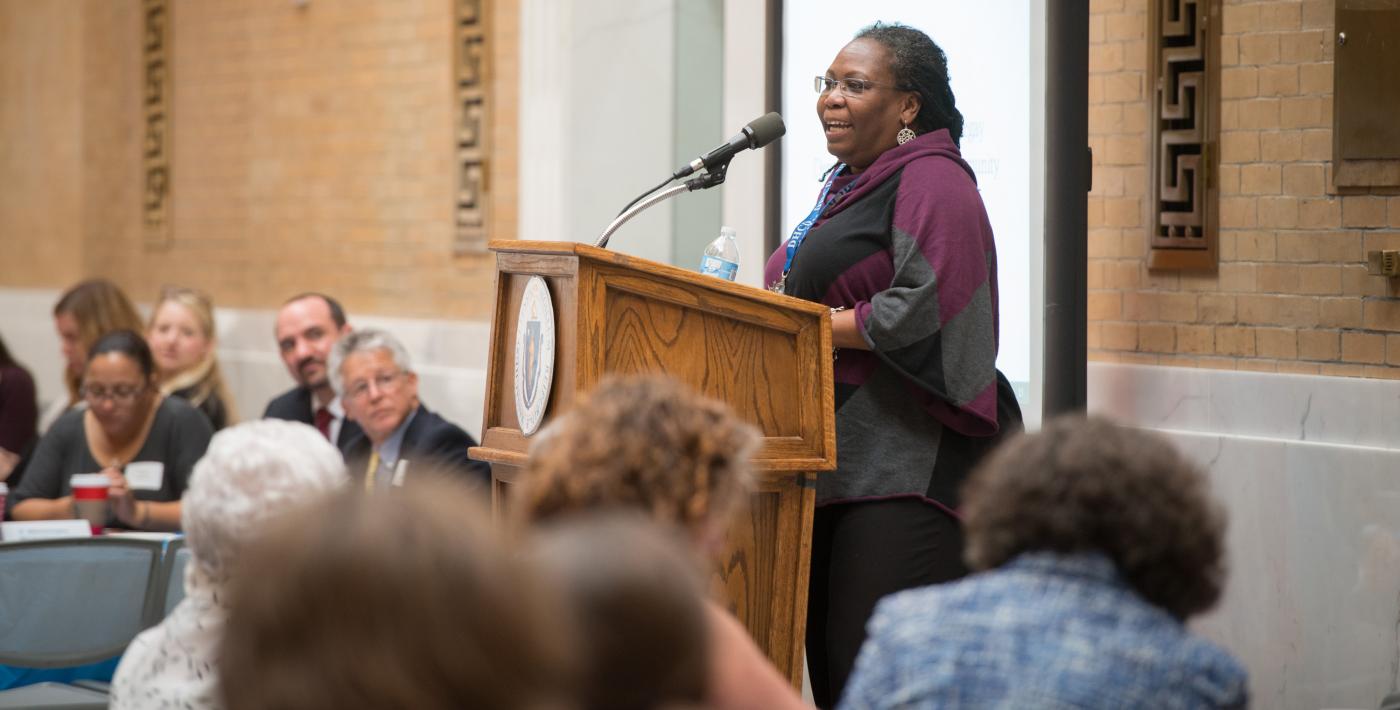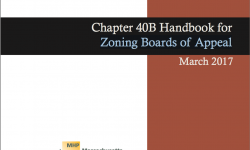CHAPA believes that everyone should have a safe, healthy, accessible, and affordable home in communities they choose.
We have a bold plan to cultivate a stronger housing ecosystem statewide by the end of the decade so that all our people, cities, and towns thrive.
Our plan sets a goal of creating 200,000 homes — including 40,000 affordable and 20,000 deeply affordable homes — by 2030.
Learn more about CHAPA's state legislative and budget priorities that will help us achieve that goal below!
2023–2024 State Legislative Priorities
We can undo discriminatory policies that perpetuate segregation and hinder generational wealth-building while creating more equitable communities by focusing on CHAPA’s top legislative priorities:
- Bold investments through a HOUSING BOND BILL will help build the deeply affordable homes we need while preserving our public housing.
- EXPANDING AND IMPROVING OUR STATE RENTAL VOUCHER PROGRAMS MRVP (H.1351/S.888) and AHVP (H.1305/S.884) to create more deeply affordable and accessible homes while helping people struggling to pay rent.
- REDUCING ZONING BARRIERS (H.1379/S.858) to allow for smart growth and keep the economy strong.
- PRESERVING THE RIGHTS OF PUBLIC HOUSING RESIDENTS (H.1340/S.857) in redeveloped properties is essential for housing stability for current and future tenants.

An Act to establish an office of fair housing and fair housing trust fund (H.1377 & S.866)
Housing discrimination can occur in many forms leading to unequal treatment of minority home seekers and renters.[1] This legislation would help in combating housing discrimination at all levels, including development, sales, lending, appraisals, marketing, tenant selection, applications, and zoning. An Office of Fair Housing and Fair Housing Trust Fund will help ensure Massachusetts has an institution and the resources needed to create, coordinate, and enforce equitable housing policy and practices across all communities and state agencies.
An Act promoting access to counsel and housing stability in Massachusetts (H.1731 & S.864)
Sponsors: Representatives Dave Rogers & Michael Day & Senator Sal DiDomenico
This legislation will create an Access to Counsel Program that provides legal representation for tenants and owner-occupants with low incomes in eviction proceedings.[2] Legal help and access to the right resources before a court eviction can prevent homelessness, stop illegal or unnecessary evictions, avoid displacement, and create a path to housing stability. The program would be phased in over five years and would help in raising awareness about tenant rights.
An Act promoting housing opportunity and mobility through eviction sealing (HOMES) (H.1023 & S.628)
Sponsors: Representative Mike Moran & Senator Lydia Edwards
As soon as an eviction case is filed, a tenant has an eviction record regardless of the outcome. This can have long-term harmful effects on peoples’ ability to access stable and safe homes. This legislation would protect many tenants from being marked with an eviction record by providing a process for tenants to petition the court to seal certain records:
-
For tenants facing no-fault eviction after the conclusion of the case;
-
For tenants facing a non-payment eviction within 14 days of satisfying a judgment or agreement; and
-
For tenants facing fault eviction after 7 years without another fault eviction case.
An Act to promote economic mobility through matched savings (H.1023 & S.628)
Sponsors: Representative Carmine Gentile & Senator Jamie Eldridge
Wealth inequality in Massachusetts has increased significantly in the past two decades. The top 17% of Massachusetts earners own almost 24% of the state’s total wealth, and the top 10% of earners own upwards of 60% of the state’s total wealth.[7] This legislation would create a matched-savings program for participants to identify a savings goal to make a life-changing or wealth-building investment, such as buying their first home. The participant receives financial education and training from a community partner organization, achieves their savings goal, and earns a matched-savings at a rate of 2:1 or 4:1.
Housing Bond Bill
The Housing Bond Bill, expected to be filed by Governor Healey in spring 2023, provides a comprehensive approach to addressing the housing needs of the Commonwealth through resources to produce and preserve affordable homes and public housing. The Housing Bond Bill will recapitalize programs that serve diverse populations, including working families, the elderly, people with disabilities, and those experiencing homelessness.
An Act codifying the Massachusetts Rental Voucher Program (H.1351 & S.888)
Sponsors: Representative Adrian Madaro & Senator Joan Lovely
Massachusetts led the country in creating the first rental assistance program, the Massachusetts Rental Voucher Program (MRVP). MRVP currently assists over 10,000 households with low- and moderate-incomes with the goal of one day achieving universal rental assistance.[3] For such a large-scale program, MRVP exists only in the state budget and is subject to change each year. This legislation grounds the program in state statute and makes improvements that include:
- Deepening affordability for renters through larger voucher payment shares;
- Improving renter safety by requiring inspections;
- Increasing the administrative fees so regional housing agencies and housing authorities can better cover the cost of the program; and
- Improving data collection.
An Act to create affordable homes for persons with disabilities (H.1305 & S.884)
Sponsors: Representative Rob Consalvo & Senator Robyn Kennedy
The need for accessible and affordable homes for people with disabilities with low incomes far exceeds the supply in Massachusetts. This bill will build more accessible and affordable homes by improving the Alternative Housing Voucher Program (AHVP), the state’s rental assistance program for persons with disabilities. This legislation would align the program better with other rental assistance programs like the Massachusetts Rental Voucher Program and allow project-basing of AHVP vouchers.
An Act to create and implement a Massachusetts flexible supportive housing subsidy pool program (H.1354 & S.855)
Sponsors: Representative Joan Meschino & Senator Brendan Crighton
A flexible housing subsidy pool program re-envisions the Commonwealth’s approach to homelessness by shifting from crisis response to create stability across a continuum of services. This legislation would create a pool of public and private resources by bundling funding for capital, operating, and supportive services to help meet the complex housing and health needs of those experiencing homelessness and to enable funds to get out quickly and equitably.
An Act providing for climate change adaptation infrastructure and affordable housing investments in the Commonwealth (H.2894 & S.1799)
Sponsors: Representative Sam Montaño & Senator Jamie Eldridge
This legislation would double the current Deeds Excise Tax to generate an estimated $300 million in new revenue each year for affordable housing and climate resiliency. This new revenue would create or preserve additional housing for 18,000 working-class homeowners and renters over 10 years; finance hundreds of millions of dollars in competitive, flexible grants to localities for climate resilience and mitigation; and assist between thousands of additional extremely low-income families per year with housing vouchers or project-based rental assistance.
An Act granting a local option for a real estate transfer fee to fund affordable housing (H.2747 & S.1771)
Sponsors: Representative Mike Connolly & Senator Jo Comerford
A lack of affordable homes and speculative home sales by higher income buyers have led to soaring housing costs and displacement in Massachusetts. This legislation would allow Massachusetts cities and towns to enact a small fee on high-value real estate sales, in order to create and support affordable housing. This legislation would generate millions of dollars for affordable housing by allowing communities to use this tool tailored to their needs.[5]
An Act to promote yes in my backyard (H.1379 & S.858)
Sponsors: Representatives Andy Vargas & Kevin Honan & Senator Brendan Crighton
Restrictive land use policies across Massachusetts have created a paper wall of zoning[4] that limits creation of new homes. This legislation proposes innovative statewide solutions through zoning to create new homes by:
- Setting a statewide affordable housing production goal;
- Allowing accessory dwelling units, or small apartments, to be built in every municipality;
- Allowing duplexes, triple-deckers, and other family-friendly housing around public transportation;
- Making it easier to pass inclusionary zoning bylaws;
- Repurposing vacant commercial properties like strip malls and offices into affordable homes; and
- Prioritizing state-owned land for affordable homes.
An Act Promoting fair housing by preventing discrimination against affordable housing (H.1295 & S.859)
Sponsors: Representative Christine Barber & Senator Julian Cyr
Prohibitive local zoning and permitting decisions have perpetuated segregation based on race, socioeconomic, and familial status in Massachusetts over decades. For example, creating only studio apartments or age-restricted homes lead to exclusion of families with children, people with low incomes, and people of color. This legislation will prohibit discrimination through zoning, permitting, or other actions to limit or exclude affordable housing under the state’s fair housing law Chapter 151B. This would strengthen our fair housing law and foster communities that are more inclusive.
An Act ensuring continued rights for public housing residents (H.1340 & S.857)
Sponsors: Representative Kevin Honan & Senator Brendan Crighton
When public housing undergoes redevelopment, there is often change in ownership from the housing authority to a private entity. This legislation would ensure that tenants would retain all rights that they have in public housing if ownership changes in a redeveloped project. Residents would also have a clear path to enforce these rights and would receive technical assistance to allow for meaningful input into the redevelopment projects.
An Act establishing a zero carbon renovation fund (H.3232 & S.2365)
Sponsors: Representative Andy Vargas & Senator Adam Gomez
The 2030 Clean Energy and Climate Plan identifies energy efficiency and electrification as the most cost-effective and technologically feasible solution for reducing carbon emissions.[6] The Zero Carbon Renovation Fund would invest $300 million towards energy efficiency through building envelope upgrades; electrification of building systems; on-site renewable energy; and using low carbon retrofit materials while prioritizing affordable and public housing, schools and environmental justice communities.
An Act establishing the healthy homes program (H.1307 & S.881)
Sponsors: Representatives Manny Cruz & Shirley Arriaga & Senator John Keenan
Substandard homes can have many hazards like poor indoor air quality caused by mold, dust, and second-hand smoke; lead paint; poor ventilation; and asbestos. This legislation will create the Massachusetts Healthy Homes Program, providing grants and low-cost loans to income-eligible homeowners and property owners to make the necessary repairs. This investment will improve about 5,000 homes, many of which are in communities of color, impacted by COVID-19, and gateway cities.
[1] Suffolk University Law School, Qualified Renters Need Not Apply Race and Voucher Discrimination in the Metro Boston Rental Housing Market (July 2020).
[2] Imbalance of Representation in Massachusetts Eviction Cases (2022) (Massachusetts Trial Court Data shows that 86.6% of property owners are represented while only 11.5% of tenants are represented).
[3] The Boston Foundation, A Right to Rental Assistance in Massachusetts (Dec. 2022).
[4] Amy Dain, The State of Zoning for Multi-Family Housing In Greater Boston (June 2019).
[5] Local Option for Housing Affordability Coalition, Evidence & Studies.
[6] Massachusetts Executive Office of Energy and Environmental Affairs, Massachusetts Clean Energy and Climate Plan for 2025 and 2030 (June 2022).
[7] Economic Policy Institute, Income Inequality in Massachusetts (July 2018).
State Budget Priorities
As we work towards CHAPA's goal of creating 200,000 new homes — including 40,000 affordable and 20,000 deeply affordable homes — by 2030, we need to ensure housing stability for households that need assistance right now.
We can create more equitable and thriving communities by investing in programs for affordable housing, homelessness prevention, and community development in the FY2024 state budget by focusing on CHAPA’s top budget priorities:
- Invest $250 MILLION in MASSACHUSETTS RENTAL VOUCHER PROGRAM (MRVP) to create 6,000 new vouchers and allow Small Area Fair Market Rents to make the vouchers more flexible to use for renting.
- Expand ALTERNATIVE HOUSING VOUCHER PROGRAM (AHVP) with $26 MILLION investment and allow project basing of AHVP to create more deeply affordable and accessible homes for people with disabilities.
- Preserve PUBLIC HOUSING with $184 MILLION in operating subsidy to ensure housing stability for current and future public housing tenants.
- Restore RESIDENTIAL ASSISTANCE FOR FAMILIES IN TRANSITION (RAFT) with $250 MILLION allocation to allow $10,000 annual benefit and removing burdensome requirement of Notice to Quit for accessing RAFT.
- Fund a STATEWIDE OFFICE OF FAIR HOUSING with $1.5 MILLION to help prevent housing discrimination while ensuring everyone is doing their part to affirmatively further fair housing.
|
Line-Item |
Program |
FY2024 Requests |
House FY2024 Budget |
FY2024 Gov’s Budget |
FY2023 Budget |
|
7004-9024 |
Mass. Rental Voucher Program |
$250,000,000 |
$173,247,567† |
$168,247,567 |
$154,000,000 |
|
7004-9030 |
Alternative Housing Voucher Program |
$26,000,000 |
$14,108,528‡ |
$14,108,528 |
$13,685,355‡ |
|
7004-9316 |
Residential Assistance for Families in Transition |
$250,000,000 |
$180,602,462 |
$162,602,462 |
$150,000,000 |
|
7004-9005 |
Public Housing Operating |
$184,000,000 |
$102,000,000 |
$92,000,000 |
$92,000,000 |
|
7004-3036 |
Housing Consumer Education Centers |
$10,185,000 |
$9,700,000 |
$8,774,000 |
$9,700,000 |
|
7004-9007 |
Public Housing Reform |
$7,700,000 |
$2,200,000 |
$2,200,000 |
$1,000,000 |
|
7004-0104 |
Home & Healthy for Good |
$8,390,000 |
$8,390,000 |
$4,162,300 |
$6,390,000 |
|
7004-0108 |
HomeBASE |
$60,000,000 |
$42,070,445 |
$42,070,445 |
$59,411,201 |
|
7006-0011 |
Foreclosure & Housing Counseling |
$3,050,000 |
$3,050,000 |
$1,500,000 |
$3,050,000 |
|
7004-3045 |
Tenancy Preservation Program |
$1,800,000 |
$2,042,755 |
$2,042,755 |
$1,800,000 |
|
4120-4001 |
MassAccess Registry |
$150,000 |
$150,000 |
$150,000 |
$150,000 |
|
4000-0007 |
Unaccompanied Homeless Youth |
$12,000,000 |
$10,545,850 |
$10,545,850 |
$9,500,000 |
|
7004-0106 |
New Lease for Homeless Families |
$250,000 |
$250,000 |
$250,000 |
$250,000 |
|
NEW |
Fair Housing Trust Fund |
$1,500,000 |
- |
- |
- |
|
NEW |
Access to Counsel Program |
$7,000,000 |
- |
- |
- |
MASSACHUSETTS RENTAL VOUCHER PROGRAM (MRVP) (7004-9024)
REQUEST: $250,000,000
MRVP is the most effective tool to immediately help people who are homeless or at-risk of homelessness find homes they can afford by providing a combination of tenant-based and project-based rental vouchers.
$250 million would create an estimated 6,000 new vouchers, help preserve affordable housing developments, and support improvements like implementing small area fair market rents and allowing vouchers to cover security deposits that will make vouchers more usable and reduce lengthy lease up times.
ALTERNATIVE HOUSING VOUCHER PROGRAM (AHVP) (7004-9030)
REQUEST: $26,000,000
People with disabilities are more than twice as likely to be homeless as their nondisabled peers. AHVP helps solve the urgent issue of homelessness and institutionalization in the disability community by creating more accessible and affordable homes with over 1,000 vouchers. $26 million would create another 250 vouchers and support program improvements including allowing vouchers to be project-based to build new deeply affordable and accessible homes.
RESIDENTIAL ASSISTANCE FOR FAMILIES IN TRANSITION (7004-9316)
REQUEST: $250,000,000
RAFT provides emergency housing cost assistance for households with very low incomes experiencing a housing crisis such as an eviction or a foreclosure. RAFT has provided a lifeline to tens of thousands of households facing the loss of their home, especially as federal emergency rental assistance funds become unavailable. $250 million will ensure this critical resource remains available and will support important program improvements including removing the requirement that a household receive a notice to quit or utility shut off before being able to apply.
PUBLIC HOUSING OPERATING (7004-9005)
REQUEST: $184,000,000
These funds support more than 43,000 deeply affordable homes at public housing authorities throughout Massachusetts. Over three-quarters of public housing residents are elderly or persons with disabilities. Unfortunately, years of underfunding have left many housing authorities struggling to operate and keep apartments in good repair. We are working to double the operating subsidy for public housing to preserve these homes for all current and future residents.
FAIR HOUSING TRUST FUND (NEW)
REQUEST: $1,500,000
CHAPA requests a new line-item to support a Fair Housing Trust Fund to support initiatives across Massachusetts to address the factors that influence housing discrimination, segregated communities, and disparities in access to opportunity. The trust fund would help eliminate housing discrimination and affirmatively further fair housing by providing resources to organizations, housing authorities, or communities that are working to enforce our fair housing laws, provide education and outreach to residents, and foster inclusive communities free from barriers that restrict access to opportunity for all those protected by our anti-discrimination laws.
HOUSING CONSUMER EDUCATION CENTERS (HCECS) (7004-3036)
REQUEST: $10,185,000
This program supports regional housing organizations that offer anyone in the Commonwealth a wide range of resources, including housing search assistance, eviction prevention, and homebuyer and foreclosure counseling. HCECs are also essential to delivering other housing and homelessness prevention resources, including rental vouchers, RAFT and HomeBASE. This funding will ensure that these housing agencies are able to continue to effectively assist hundreds of thousands of residents across Massachusetts in need of housing assistance.
PUBLIC HOUSING REFORM (7004-9007)
REQUEST: $7,700,000
This program funds the implementation of public housing reform, passed in 2014. These reforms improve governance and operation of housing authorities by assisting with capital improvements, management, and operating. $7.7 million will help support new initiatives to support the health and well-being of residents, including for tenant organizing, maintenance apprenticeship programs, transportation, and language access.
HOME AND HEALTHY FOR GOOD (7004-0104)
REQUEST: $8,390,000
Home and Healthy for Good provides deeply affordable homes and support services to individuals experiencing chronic homelessness through a housing first model that is less costly and more effective than managing residents’ homelessness and health problems on the street or in shelter. Annually, the program saves the state an estimated $11,700 per housed tenant because of a decreased reliance on other expensive public services once an individual is in permanent supportive housing.
HOMEBASE (7004-0108)
REQUEST: $60,000,000
HomeBASE helps families with children avoid or exit emergency shelter, including staying at hotels or motels, through stabilization services and up to $10,000 to pay rent, utilities, security deposits, and other expenses that would allow them to stay in their homes or move out of shelter. The additional funds would allow families to renew their HomeBASE benefits if otherwise facing a return to homelessness.
FORECLOSURE AND HOUSING COUNSELING (7006-0011)
REQUEST: $3,050,000
This program, funded through retained revenue from licensing fees for mortgage loan originators, supports foreclosure prevention and housing counseling that assist over 11,000 people across the Commonwealth each year. By allowing the Division of Banks to retain more revenue, it can support more foreclosure and housing counseling.
TENANCY PRESERVATION PROGRAM (7004-3045)
REQUEST: $2,000,000
The Tenancy Preservation Program helps prevent homelessness by working with households with disabilities facing eviction. In consultation with the Housing Court, the program works with landlords and tenants to determine if the disability can be reasonably accommodated and the tenancy preserved.
MASSACCESS REGISTRY (4120-4001)
REQUEST: $150,000
Everyone should have solid information for making choices about one of the most important decisions–where to live. The MassAccess line-item supports the Housing Navigator website which provides a free online tool that makes it simple to search for affordable and accessible rentals statewide. Working with owners and public sector partners, the site has built a database of income-restricted rentals from all over the state. It shows listings with reliable, actionable information ensuring that renters find details they can trust.
UNACCOMPANIED HOMELESS YOUTH (4000-0007)
REQUEST: $12,000,000
This program helps meet the housing and support service needs of unaccompanied youth and young adults, ages 24 and younger, who are experiencing homelessness. Additional funds will provide much-needed resources to further build up a systematic, effective response to unaccompanied youth and young adult homelessness across Massachusetts through providing affordable homes and support services.
NEW LEASE FOR HOMELESS FAMILIES (7004-0106)
REQUEST: $250,000
New Lease helps find homes for families living in shelters by implementing a preference for these families in affordable housing developments across the state. Through New Lease, homeless families can live in desirable communities with the supports they need for success. The funding will allow New Lease to continue serving the over 300 families it works with to help find and maintain homes.
ACCESS TO COUNSEL (NEW)
REQUEST: $7,000,000
Data demonstrates that access to counsel results in greater housing stability and saves money. Tenants facing eviction are overwhelmingly individuals living in poverty, females, and people of color. Evictions have far-reaching consequences beyond housing insecurity and negatively affect people’s physical and mental health. Unfortunately, while 86% of landlords are represented, only 11.5% of tenants have a lawyer. $7 million will help support a new statewide Access to Counsel program to be administered by the Massachusetts Legal Assistance Corporation to help prevent evictions and achieve housing stability.






